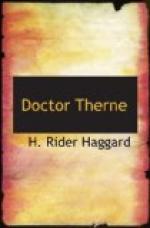Within a year it was my lot to listen to an eminent leader of that distinguished member (with the distinguished member’s tacit consent) pressing upon an astonished House of Commons the need of yielding to the clamour of the anti-vaccinationists, and of inserting into the Bill, framed upon the report of a Royal Commission, a clause forbidding the prosecution of parents or guardians willing to assert before a bench of magistrates that they objected to vaccination on conscientious grounds.
The appeal was not in vain; the Bill passed in its amended form; and within twenty years I lived to see its fruits.
At length came the polling day. After this lapse of time I remember little of its details. I, as became a Democratic candidate, walked from polling-station to polling-station, while my opponent, as became a wealthy banker, drove about the city in a carriage and four. At eight o’clock the ballot-boxes were sealed up and conveyed to the town-hall, where the counting commenced in the presence of the Mayor, the candidates, their agents, and the necessary officers and assistants. Box after box was opened and the papers counted out into separate heaps, those for Colford into one pile, those for Therne into another, the spoiled votes being kept by themselves.
The counting began about half-past nine, and up to a quarter to twelve nobody could form an idea as to the ultimate result, although at that time the Conservative candidate appeared to be about five and thirty votes ahead. Then the last ballot-box was opened; it came from a poor quarter of the city, a ward in which I had many supporters.




